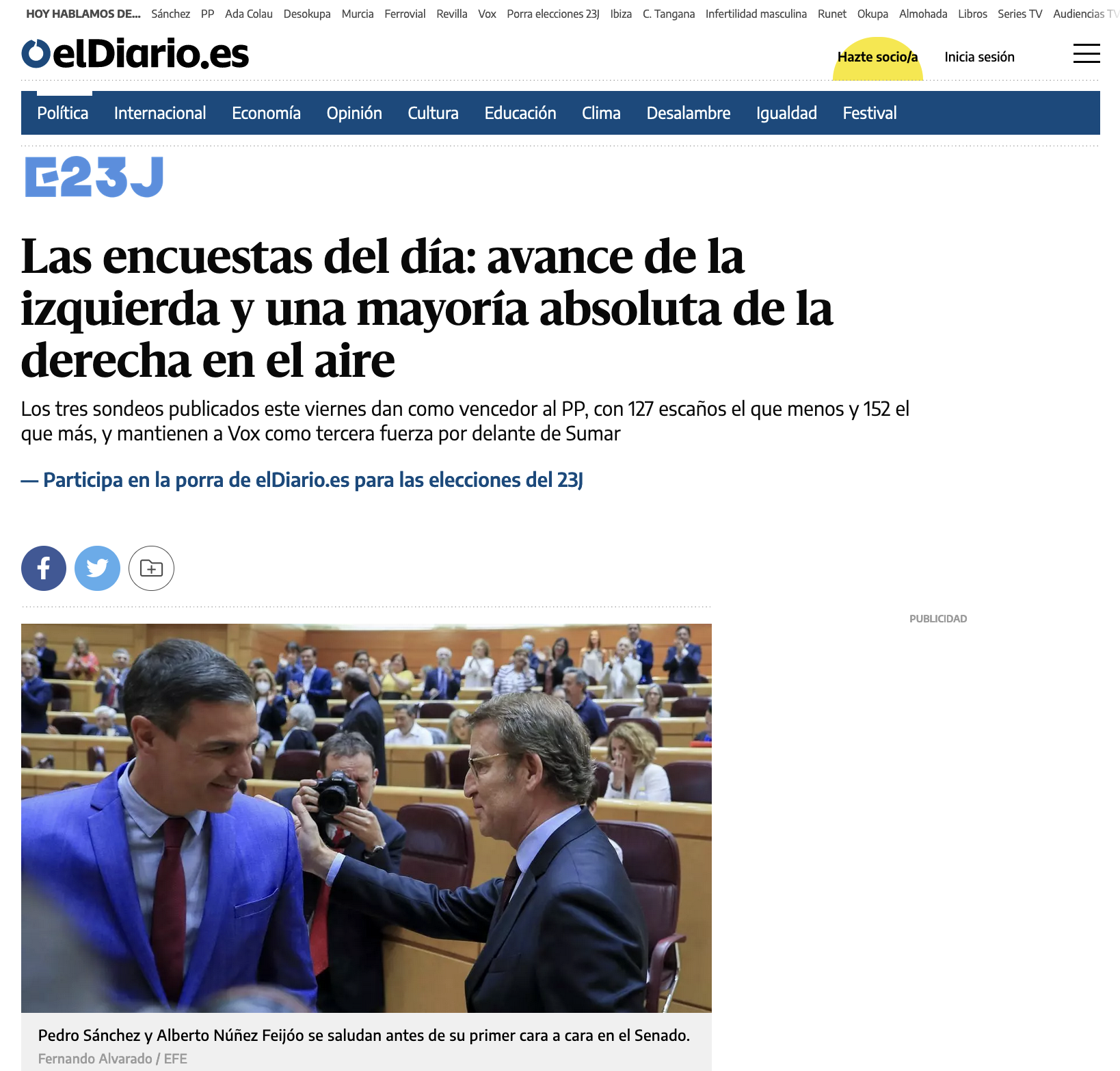Spain: Here Come the Fascists (Who Never Really Left)
“Fascism Kills. Neither Forget nor Forgive” graffito in Toledo, Spain. (Source: Adam Jones, Ph.D./, CC BY-SA 3.0 via Wikimedia Commons)
In just over two weeks, Spanish voters will go to the polls for national elections, and the implications - both within and beyond the country - couldn’t be more far-reaching. I just arrived in Madrid and will be spending the next 12 months here, and I hope to provide Weave News readers with a critical, justice-oriented perspective that might be missing from much of the mainstream media coverage of Spanish politics.
So, why are these elections so important?
The immediate context
Spain’s current president, Pedro Sánchez of the Socialist Party (PSOE), responded to his party’s poor showing in the recent municipal and regional elections by calling for early national elections on July 23. Commentators here characterized his decision as a political gamble designed to give the right-wing Popular Party (the primary opposition party in recent years) as little time to prepare as possible.
An article in the Spanish digital news site El Diario cites poll data showing gains for the Left but also the possibility of an absolute majority for the Right (July 7, 2023).
Polls indicate that the PP is poised to do well in the national elections, but as is often the case in parliamentary systems like Spain’s, the reality is complicated by the existence of smaller parties and the frequent need to build coalitions.
In this case, neither the PSOE nor the PP is likely to win an absolute majority of seats in parliament. While there are several small, regional parties that can sometimes play key roles, the path to victory for each of the two major parties would involve a coalition with an emerging party. And both of these emerging parties represent constituencies that are organically connected with Spain’s long history of deep ideological struggle between radical and far-right visions.
The specter of resurgent fascism
The PP is widely characterized in mainstream media coverage as a “traditional conservative” party, but this is a misleading label that ignores a great deal of Spain’s past and present. In reality, the PP is the primary inheritor of the fascist infrastructure that held the country in its grip during the Franco dictatorship (1939-1975). This is particularly true in the judiciary, where judges sympathetic to the Francoist project remain influential nearly a half-century after the formal end of fascist rule.
In this sense, despite the PP’s formal commitment to democracy and the rule of law - a claim that ignores the party’s many shameful corruption scandals - fascism is very much part of the Spanish political system and, indeed, the wider society. Efforts by the PSOE to formalize a process of recovering the memory of those who were fascism’s primary victims have generated strong opposition from the PP, suggesting that Spain’s process of grappling with the long-term impact of fascism remains profoundly unfinished.
But the recent rise of Vox, an openly far-right party inspired by Donald Trump’s MAGA movement and other neo-fascist movements in Europe, has taken this dynamic to a new and troubling level. Vox’s popular support is growing, and its members are now part of local and regional governments in several parts of the country.
Given that the PP would inevitably need to pact with Vox in order to build a governing majority, it is important to understand what Vox represents. Their messaging draws on the “eternal fascist playbook” I have discussed elsewhere. Vox leader Santiago Abascal regularly targets immigrants, women, members of the LGBTQ+ community, and other vulnerable groups with his aggressively nationalist, patriarchal rhetoric. Using terminology associated with Spain’s colonial history, he has spoken openly of his party’s goals as a reconquista (reconquest) and seems to redouble his culture war efforts every week.
Vox leader Santiago Abascal (right) appears at a Vox rally in Marbella, Spain, with Italian far-right leader Giorgio Meloni (second from left) in 2022. (Photo: CC0 1.0 Universal)
In short, a PP-Vox alliance - already underway with ongoing talks about potential coalition terms - would essentially represent a union between those who keep their fascist sympathies hidden under the white gloves of establishment politics and those who don’t bother hiding their desire to return the country to its darkest days.
What is happening with the Left?
Meanwhile, various progressive and leftist movements and parties have been oscillating between bitter infighting and efforts to build a united front against fascism. These efforts have been complicated by the fact that the PSOE is essentially a centrist, neoliberal party rather than a “socialist” body in any meaningful sense.
Podemos, the party that emerged out of the 2011 indignados movement against austerity, has been a member of the PSOE-led government as part of the Unidas Podemos coalition but has seen its successes met with a fierce campaign waged against it by right-wing corporate media. True to the misogynist orientation of the Spanish Right, much of this campaign has viciously focused on Irene Montero, a top Podemos figure who has served as Minister of Equality in the current coalition government and who expended considerable political capital in promoting a “yes means yes” law against sexual violence and an ambitious law codifying trans rights.
Podemos fared so badly in the municipal and regional elections that the party, once a rising star that had its eye on building a governing majority, has been forced to join a new Left coalition, Sumar, for the upcoming national elections. The bruising negotiations that resulted in the coalition agreement included Diaz’s insistence that Montero be excluded from Podemos’ list for those elections.
Antifascist sticker in Cádiz, Spain. (Photo: John Collins)
Amidst these machinations, key figures on the Left remain vocal on the question of fascism, seeking to focus popular attention on the threat posed by a PP/Vox alliance. Legendary film director Pedro Almodóvar has described July 23 (link in Spanish) as an election not simply about “the party that will govern us” but also about the possibility of democracy itself. He characterized the choice as one between two Spains: the fascist Spain represented by Vox, and the “modern” Spain that has shown itself to be a “pioneer” on questions of gender.
Justice in the balance
The stakes for these elections are incredibly high for a country that seems to be at the classic fork in the political road. Iñigo Errejón, a political scientist and former Podemos member who split from the party to form the Más Madrid platform in 2019, summarized the situation clearly and concisely in a recent interview. The need for coalition-building, he said, means that each of the main candidates for president “comes with another candidate” - Vox’s Abascal with the PP’s Alberto Nuñez Feijóo, Sumar’s Yolanda Diaz with the PSOE’s Sánchez.
Errejón’s point was that Spaniards need to have no illusions about what their votes will mean: a vote for the PP is a vote for Vox. With that in mind, people who care about social justice are trying to figure out what to do. Many on the Left are extremely reluctant to support the PSOE given past betrayals. Yet as I learned earlier this week when listening to a spirited conversation among a group of leftists, there is also a recognition that voting for Pedro Sánchez’s party may be a necessary step in order to keep Vox out of power.
A history of struggle with global implications
Finally, it is important to remember one of the key lessons of the past century: what happens in Spain reverberates far beyond the country’s borders. At a minimum, we need to recognize that the emergence of Vox is part of a larger story that includes rising far-right sentiment throughout much of Europe and diverse forms of nativist, authoritarian movements globally.
Anti-Vox sticker in Cádiz, Spain. (Photo: John Collins)
Such movements arise out of a political moment where climate crisis and the displacement of millions of vulnerable people are fueled and exacerbated by the worst excesses of capitalism and militarism. If we are going to build a world where solidarity is the norm and where fascism is finally unthinkable, we would do well to keep an eye on Spain.





